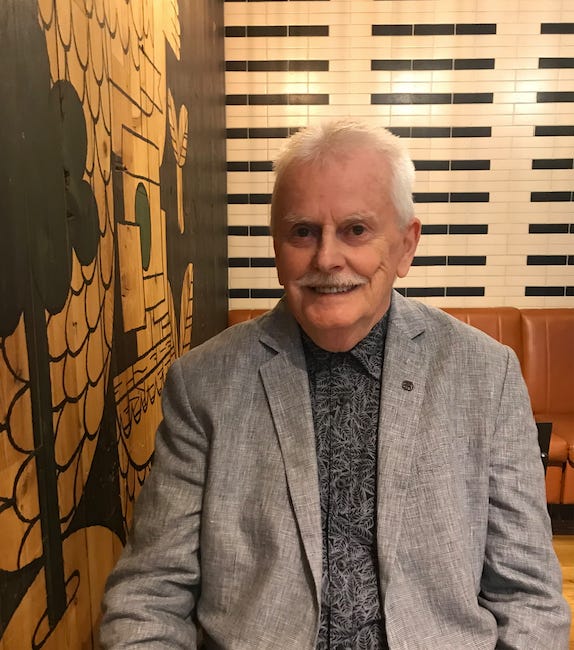Theatre review: Beckett at Plugd
Pádraig O’Connor spends some time with Beckett’s neurotic outsiders in a record shop on Cornmarket Street.
There are just two ways of approaching any attempt to stage the later dramatic works of Samuel Beckett: complete deference or experimentation. While this could easily be said of any interpretation of an artist’s work, Beckett’s scripts in particular, are so precisely written that any deviation from the instructions on the page, immediately veers into the realm of unchartered territory and the production takes on a life of its own, daring to leave the safety of the womb it was gestated in. And wombs, it should be noted, play a significant role in the Dublin writer’s work.
Gaitkrash are a collaborative group, comprised of theatre artists Bernadette Cronin and Regina Crowley, along with sound and visual artist Mick O’Shea. They are a self-described “frontier of experimentation” and their latest offering, is two back to back performances of Beckett’s ‘Footfalls’ and ‘Not I’, in the unique location of Plugd record shop and cafe on Cornmarket Street.
While these new stagings are not entirely radical departures from the original works, they still nonetheless sever the umbilical cord to the very meticulous writer’s texts and thus set out to brave new ground and offer the audience “a fresh experience of Beckett’s haunting pieces”.
First up was ‘Footfalls’ performed by Bernadette Cronin. It is a short play in four parts whose action, if you could call it that, consists of a ghostly woman, May, pacing back and forth talking to herself and listening to the voice of her elderly mother. This is Beckett after all. There are no concessions in terms of plot or narrative to an audience whose very existence he was almost indifferent to. Yet the play, at its very core, is a rather simple piece, but because of this simplicity it is still very hard to get right.
Oddly, the more important voice in the play is that of the unseen mother, which in this production is a recording by Máirín Prendergast, which simply does not work, as it shatters the interiority of the world we are supposed to inhabit as an audience. Instead, it creates two separate worlds, one clearly live and the other technological. Beckett explored this dynamic elsewhere in ‘Krapp’s Last Tape’, but in ‘Footfalls’ the voice has to be somehow also present.
Furthermore, the two voices didn’t really sound connected or believable as a mother and daughter. This is of course a difficult thing to establish, but certainly not helped by one emanating from a speaker. Cronin, not nearly disheveled enough looking, plays the part with tears in her eyes from the beginning, which left little room to manoeuvre emotionally as the play progresses. A more subtle approach, identifying May as some sort of insomniac who can’t sleep, would've allowed for a greater shift in tone and might’ve impacted the audience more. Also, the story she tells in Part III involving Amy and Mrs. Winter needed more far clarity in terms of the two characters she was giving voice to.
When this piece ended, the audience was then invited to turn over their left shoulder and take in the second offering of the night, ‘Not I’, performed by Regina Crowley. This is a very famous short dramatic monologue, where the audience can only see a mouth lit up by a single spotlight, while the rest of the actor’s features are entirely blacked out.
Crowley gives a decent performance and the strain of the rapid fire delivery was clearly visible in the flecks of spit developing at the corner of her mouth as she fired through the text. However, as fast as she was going, it still wasn’t really fast enough to create the intense desired sensory effect on the audience's nerves, which is what this piece ought to do.
This was more of a close up viewing, understandable in the confined space and interesting as a result, but not nearly the assault it could’ve been. The choice of cloaking Crowley’s head also meant that at times her breath caught the cloth and blew it upwards, which destroys the illusion that all that is on stage is a mouth. While all of this may seem like nitpicking, because of the sparse nature of the pieces, these little details take on huge significance and are impossible to overlook.
You certainly wouldn’t bring some poor unsuspecting soul along to these two plays and say you’re in for a lovely evening. No, instead, these are performances for admirers of Beckett’s work and though flawed, still took some audacity to take on.
Afterward, the audience were invited to have a glass of whiskey or apple juice and reflect on what they had just witnessed. A nice gesture, which was appreciated by one and all, as well as the fresh air that blew in when the front door was opened and the audience could once again feel the comfort of the natural world, slowly moving on from Beckett’s neurotic outsiders.
Beckett At Plugd finishes upon Monday, September 18 at Plugd. Tickets and more information here.
Pádraig O’Connor is a playwright living in Cork city. You can read more of his reviews for Tripe + Drisheen here.
Gentleman Joe: documenting Cork on Twitter
Joe Healy has had a Twitter account since 2018, but it’s only this year, indeed in the past few months that it’s really got going. Since re-joining the global soap box a few months back, Joe, now in his 70s, p…





